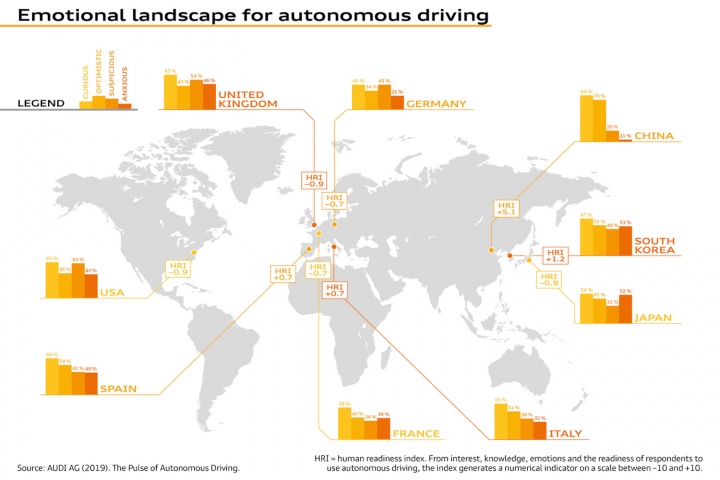Audi, being as it's busy developing autonomous car technology, thought it would be a good idea to find out what people around the world thinks of it. In a study, carried out with the help of Ipsos, the German car maker now reckons that there are five different types of people when it comes to thinking about autonomous cars.
Five groups of people
The five groups range from the most skeptical to the most enthusiastic, and they are; The Suspicious Driver (usually older, deeply uncomfortable with the thought of vehicle autonomy, doesn't trust the idea); the Safety Oriented Reluctants (who aren't keen, but will use autonomous vehicles if they have a proven safety benefit); the Open Minded Co-Pilots (sees the potential, and are open to autonomy as long as the driver can still take control when they want); the Status Oriented Trendsetters (want to use their autonomous vehicles as a way to show off); and the Tech Savvy Passengers (love the idea of autonomy, want it introduced as soon as).
Data allows for better legislation and business decisions
"This study is more than just a welcome addition to our knowledge about the phenomenon of autonomous driving," says Dr Luciano Floridi, professor of Philosophy and Ethics of Information and director of the Digital Ethics Lab, University of Oxford, and member of the scientific network of the initiative "&Audi". "It is a necessary step for any policy- and law-making decision, as well as any R&D and business strategy that intends to be proactive and informed in delivering a better world."
A new 'Emotional Landscape'
Audi says that, as a result of this research, it has found that there's a confused and often conflicted 'emotional landscape' surrounding autonomous cars.
Internationally, 82 per cent of people say that they have a strong interest in autonomy, while 62 per cent say that they're curious about it. Between 72 and 76 per cent say that they recognise the potential for improved mobility and convenience, while 59 per cent say they appreciate the potential for improved safety.
More than half of people say that they would like to at least try out autonomous driving, but 70 per cent say they're worried about driving without being in control, while 66 per cent say that they're worried about 'residual risks ' - unknown unknowns, we suppose. A full 41 per cent said that they're suspicious of the technology, while 38 per cent said that they were 'anxious' but sadly Audi doesn't tells about what, exactly. Mostly, people said that they would be happy to hand over control to the computers for parking and dealing with traffic jams on motorways.
Audi also conducted a study into which countries and regions are the most or least enthusiastic about the advent of autonomous motoring, the so-called 'Human Readiness Index' or HRI. The Chinese (HRI +5.1) are euphoric, and South Koreans (HRI +1.2) too are above-average in their positive view of the technology. In Europe the Spanish and Italians lead the field (both HRI +0.7). Germans and French are relatively reserved (both HRI -0.7), as are the Americans, Japanese and British (all HRI -0.9). The HRI combines knowledge of, interest in, emotions about and readiness to use self-driving cars to produce a numerical indicator between -10 and +10.
"Automated and autonomous driving has the potential to improve our mobility substantially," says Thomas Müller, head of Automated Driving at Audi: "On the way there, alongside technical development, it is of decisive importance to convince people. The study provides us with differentiated insights about where people stand in relation to autonomous driving and how we can establish suitable expectations about the new technology in society."




